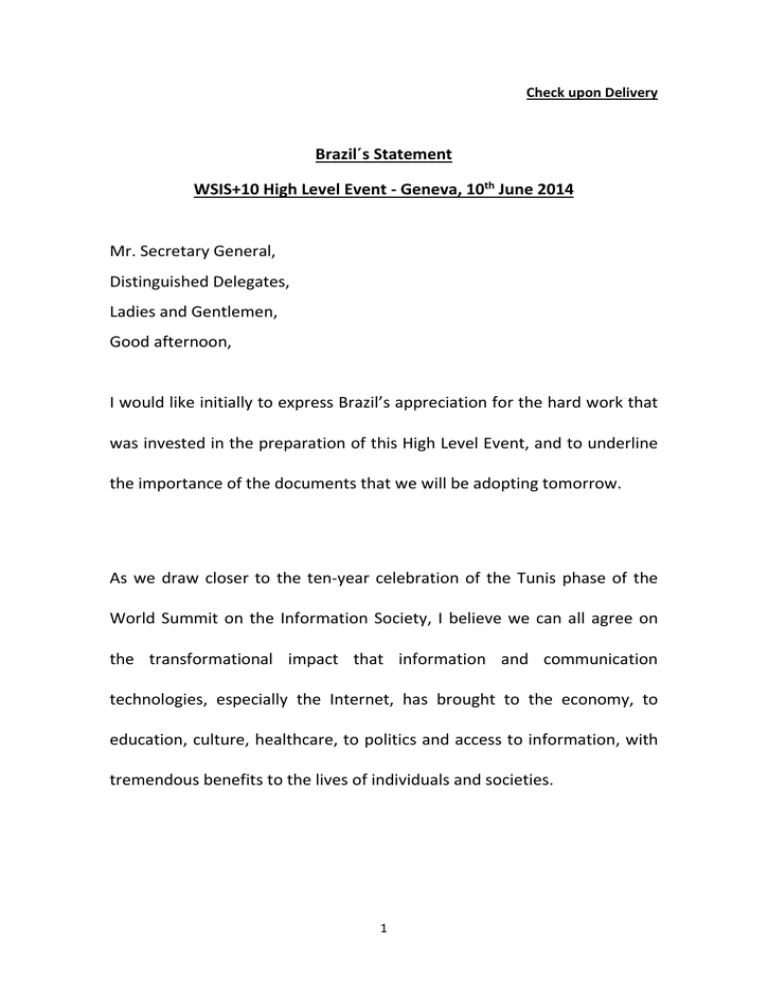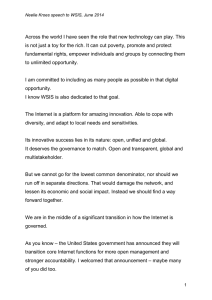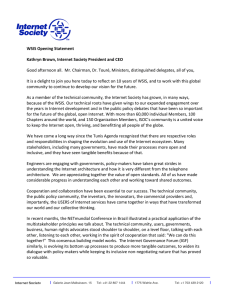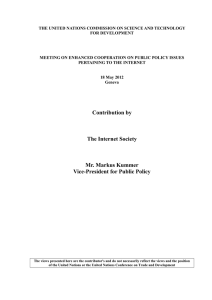Brazil´s Statement WSIS+10 High Level Event - Geneva, 10 June 2014
advertisement

Check upon Delivery Brazil´s Statement WSIS+10 High Level Event - Geneva, 10th June 2014 Mr. Secretary General, Distinguished Delegates, Ladies and Gentlemen, Good afternoon, I would like initially to express Brazil’s appreciation for the hard work that was invested in the preparation of this High Level Event, and to underline the importance of the documents that we will be adopting tomorrow. As we draw closer to the ten-year celebration of the Tunis phase of the World Summit on the Information Society, I believe we can all agree on the transformational impact that information and communication technologies, especially the Internet, has brought to the economy, to education, culture, healthcare, to politics and access to information, with tremendous benefits to the lives of individuals and societies. 1 While recognizing how much we have achieved so far, the truth is that we still face the challenge of bringing the benefits of the Information Society to over half the world population. As we realize that many of the targets established in the WSIS Geneva Plan of Action are still far from being fulfilled in a satisfactory manner, we must recommit to their achievement. Among other priorities, we must redouble our efforts to ensure the expansion of affordable, reliable and secure broadband Internet access to all. Brazil, as most developing countries, views the ICTs, particularly the Internet, as a tool for progress, and has a legitimate aspiration to bring to the center of the debate mechanisms that will facilitate investment in Internet infrastructure and human resources. This includes issues such as capacity building in the management and governance of the Internet, as well as mechanisms that ensure that its operational costs become more evenly distributed among those who connected earlier and those who have come online later. 2 Brazil has consistently defended that ICT-related governance processes, including Internet governance, should promote sustainable and inclusive development, as well as the promotion of human rights. Human rights, including freedom of expression and the right to privacy, should be at the center of our concerns as we discuss Internet Governance. The principle according to which human rights must be promoted and respected just as much online as offline must be continuously reaffirmed. As we review the existing Internet governance mechanisms, it is essential that they are placed in a broader framework that is democratic, transparent, multilateral and multistakeholder. In fact, the Internet ecosystem benefits from the contributions of multiple stakeholders, and no single body can be made responsible for all aspects relating to the Internet. 3 However, we note that the debate over the future of Internet governance is sometimes wrongly framed in terms of a choice between an idealized “multistakeholder” model and a “multilateral” model. Brazil upholds and practices domestically the multistakeholder model of Internet Governance, out of the belief that all Internet-related issues can and should be discussed in a multistakeholder environment. Nonetheless, different issues of different nature may require, accordingly, differentiated frameworks, taking into account the differentiated roles and responsabilities associated to the various stakeholders. A number of issues are best dealt with by multistakeholder institutions, while multilateral decision-making (informed by multistakeholder processes) is necessary on issues that must be enforced directly through international mechanisms, or through harmonization of national level legislation and policies. Examples are matters involving trade and taxation, legal jurisdiction and cybercrime. 4 It is for this reason that we are convinced that there is no contradiction between multistakeholderism and multilateralism in Internet Governance. As stated by President Dilma Rousseff at the opening session of the Global Multistakeholder Meeting on the Future of Internet Governance, also known as NETmundial, which was held in São Paulo last April: "an Internet that is subject to intergovernmental arrangements that exclude other sectors of society is not democratic. Multi-stakeholder arrangements that are, in turn, subject to oversight by one or few states are not acceptable either. The opposite of both is unilateralism, which would be unacceptable to all of us. We need more, not less, democracy." It is our understanding that the 10-year WSIS Review process should go beyond the simple evaluation of the implementation of the Action Lines. We have yet much to do in the coming years, including a renewed joint effort to move towards completion of the task we assigned to ourselves in the WSIS outcome documents. In Brazil´s perspective, the validity of those documents as the fundamental framework for global efforts towards inclusive, democratic, transparent and development-oriented Information Societies must be reaffirmed. 5 In this sense, we view the outcome of this High Level Event as an important input to the overall review process to be carried out by the UN General Assembly in 2015, as per paragraph 111 of the Tunis Agenda. In the context of the Overall Review, and considering the challenges we have faced over the past ten years, we will have the opportunity to discuss which new emphases should be given to our post-2015 Agenda in order, in particular, to overcome the challenges related to Internet governance and to the digital divide. I would like to reaffirm our expectations that we will be able to agree on the format and modalities for the 2015 Overall Review process, in a way that allows us to evaluate, with full participation of all stakeholders, the successes and shortcomings experienced in the implementation of the recommendations contained in the WSIS outcome documents, also taking into account, where appropriate, the results of other meetings and processes. The tasks before us are manifold and they remain, in many cases and to a large extent, unfulfilled. The challenges before us are therefore extraordinary but we are convinced that they are not insurmountable. 6 NETmundial sought to offer a contribution to the international debate on Internet Governance, through the identification of rough consensus on both Internet Governance Principles and a Roadmap for the future evolution of the Internet Governance Ecosystem. We are glad we could host such a meeting and we hope that the lessons learned in the course of its preparation and the positive ambiance we were able to create collectively before and during the São Paulo meeting, could serve as a valuable contribution to our efforts to make the Internet evolve. Thank you! 7


